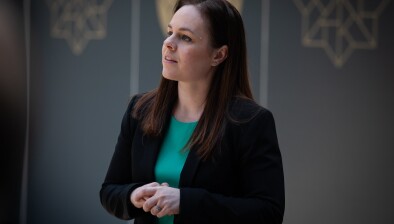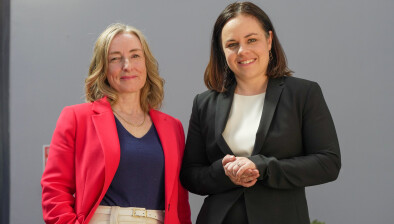Scottish economy 7.1% smaller than before pandemic

Fiona Hyslop
Scotland’s economy is 7.1% smaller than it was before the coronavirus pandemic, according to the latest Scottish Government’s Monthly Economic Brief.
The brief also revealed that Scotland’s GDP fell 1.4% in November (UK: -2.6%), having grown for six consecutive months following the sharp fall in March/April during the national lockdown when GDP fell by almost a quarter. The fall in output in November primarily reflects the tightening of restrictions during the month, with consumer facing parts of the service sector most directly impacted driving the fall.
Scotland’s GDP in November was 7.1% lower than its pre-pandemic level in February (UK: 8.5%) showing that significant progress in the recovery has been made from the national lockdown back to pre-pandemic levels of output. However, latest business surveys have signalled ongoing challenges with a fall in the proportion of firms trading, and a renewed increase in the proportion of the workforce that are furloughed.
For some sectors, the start of the year has also seen some trade disruption and delays in the movement of goods following the end of the EU-exit transition phase. Despite this, the latest restrictions, both in the UK and internationally, appear to have had a smaller impact on the economy than had initially been expected, reflecting how businesses and consumers have adapted to living with restrictions, while business confidence also started to pick-up reflecting positive news about vaccine developments.
The pattern of growth in Scotland over 2020 has been broadly similar to the UK as a whole, with variations in the pace of growth across months reflecting differences in the sectoral makeup across the UK and the timing and duration of restrictions.
However, the necessary tightening of restrictions at the end of the year, domestic and international, is expected to further slow the pace of recovery in the short term across the UK as a whole.
Reflecting these short term challenges, the Scottish Fiscal Commission (SFC) has forecast Scotland’s GDP to fall 5.2% in the first quarter of the year and for unemployment to rise to 7.6% in the second quarter when the furlough scheme ends in April.
This highlights how critical the furlough scheme has been in supporting jobs and incomes at a time when output has fallen sharply and the risk of a sharp rise in unemployment when the scheme is ended. Furthermore, the longer term outlook remains extremely uncertain and will be strongly influenced by the roll out of the vaccination programme and the ongoing need for restrictions.
The SFC’s latest forecasts see a moderate recovery in 2021, reflecting an expectation that some form of restrictions remain in place over the course of the year. This strengthens to 7.5% in 2022, as restrictions are removed. Overall, output is not expected to return to pre-pandemic levels until the start of 2024. This not only highlights the extent of the recovery that still lies ahead, but also the importance of supporting businesses and jobs through this period to ensure businesses remain viable and the level of scarring from this economic crisis is minimised.
Commenting on the brief, economy secretary Fiona Hyslop said: “While some of the difference can be explained by the extent and timing of restrictions across the UK, Scotland has a broad based economy with many strengths and the different sectoral makeup of our economy also has a bearing.
“As we can see from this analysis, the necessary tightening of restrictions to control the virus weighs on the short term outlook - although it is important to highlight the roll-out of our vaccination programme provides us with optimism for the future and business confidence has started to pick-up as a result.
“Furthermore, the latest restrictions, both in the UK and internationally, appear to have had a smaller impact on the economy than had initially been expected, reflecting how businesses and consumers have continued to make sacrifices and adapted to living with restrictions, and for that we are incredibly grateful.”
She added: “We know recovery will be a long road, and combined with the damage caused by Brexit, this remains an extremely uncertain time for the economy and jobs. As a responsible Government we continue to do everything in our power to protect Scotland’s economy and ensure that as many people as possible keep their livelihoods.
“Our package of business support now totals over £3 billion, and our support for economic recovery is worth more than £1 billion. Using all the powers we have, we will rebuild a stronger, more resilient and sustainable economy for Scotland – with a laser focus on creating new, good, green jobs.
“As part of that, we have just announced a further £125 million towards our Young Person’s Guarantee, the National Transition Training Fund and other initiatives ensuring the future workforce has the skills needed for a green recovery and supporting those at risk of long term unemployment. This includes personalised employment support and retraining for those who have been made unemployed or are at risk of redundancy due to the pandemic.
“In the meantime, we continue to call on the UK Government to give us the additional powers we need to manage our response to this crisis and prioritise our recovery.”







